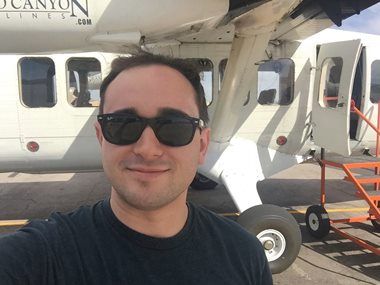
A frequent flyer who has visited more than 50 countries, Avery Campbell, Law’16, can now call himself a published author as well. Last month, his paper, “Airline Mistake Fares in Canada and the United States,” will appear in McGill’s Annals of Air and Space Law. In the article, he examines the regulatory systems in both Canada and the United States on mistake fares, making recommendations for regulators on how to manage them in the future.
A mistake fare occurs when an airline fare is posted at an unusually low rate due to human or technical errors, often resulting in extremely reduced prices or first-class fares many times cheaper than the intended rate. Campbell notes, for example, that a fare between Yangon, Myanmar and Montreal was listed for under $1,000 when it should have been many times that amount, while Delta Airlines recently released a series of domestic flights for $0.
Mistake fares are a relatively common occurrence, costing airlines millions of dollars in lost revenue. Given that news on mistake fares can be shared quickly through social media, more people are purchasing them than ever. The law on mistake fares is thus becoming more important, and Campbell’s intention for his paper was to help consumers, lawyers, judges and regulators understand the current legal framework.
“Everyone loves getting a good deal. However, there’s a very thin line separating a good deal and benefiting from a mistake,” says Campbell. “This paper provides judges, regulators, and other interested parties a thorough review of the law regarding mistake fares in both Canada and the U.S.”
Campbell wrote the paper as an independent study project for Professor Martha Bailey, LLM’88. While publishing a paper was never a goal of his in law school, his professor encouraged him to submit it and it was quickly accepted.
“Avery’s paper addresses the important but generally overlooked issue of mistake air fares,” says Bailey. “It will be the ‘go-to’ paper on this issue in Canada, and provide guidance to courts and policy-makers.”
Outside of his travels and studies, Campbell runs a popular blog on the airline industry, as well as a small company, Awarding Canada, which offers consulting services for customers who want to use their frequent flyer rewards while minimizing taxes and fees. He is therefore no stranger to the topic of his article.
“I have benefitted immensely from airline mistake fares,” he says, “so it was a natural paper to write.”
Read Avery Campbell's paper on SSRN.